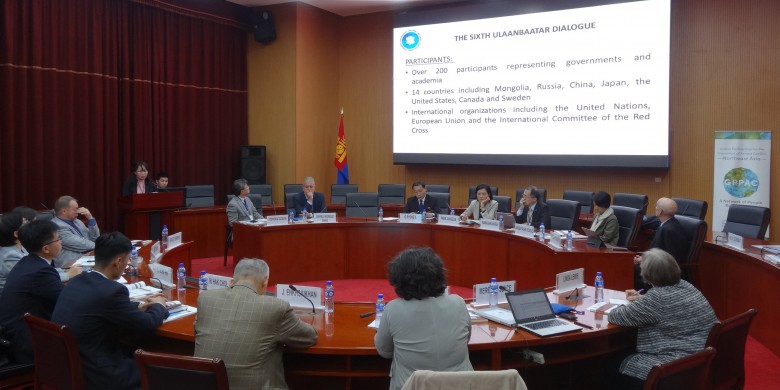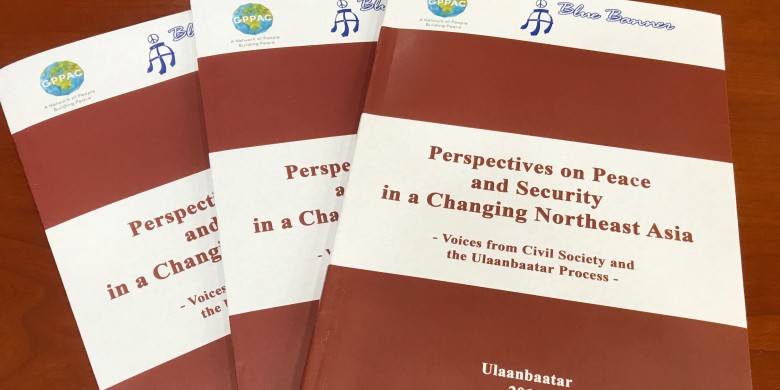Making a habit of dialogue - GPPAC Northeast Asia and the Ulaanbaatar Process V meet in Mongolia
The Global Partnership for the Prevention of Armed Conflict (GPPAC) Northeast Asia Regional Meeting and fifth Ulaanbaatar Process meeting was convened in Ulaanbaatar, Mongolia between August 22-24, 2019. Hosted by the Mongolian NGO Blue Banner, the meeting was co-convened by the Global Partnership for the Prevention of Armed Conflict (GPPAC) including its Northeast Asian Regional Secretariat, Peace Boat.
The Ulaanbaatar Process is a civil society dialogue on peace and stability for the Korean Peninsula and broader Northeast Asian region, and has been held annually since its launch in 2015, with the goal of “making a habit of dialogue.” While a great distance remains to go to achieve sustainable peace in the region, participants reflected upon the changes, which have taken place in Northeast Asia in these several years, acknowledging the momentous steps that have been made and the significant progress made during this period by both the Ulaanbaatar Process itself and other initiatives for peace in the region.
Approximately 25 participants joined the meeting, including network members and partners from Beijing, Kyoto, Pyongyang, Seoul, Shanghai, Tokyo, Ulaanbaatar and Vladivostok, as well as the United States, Southeast Asia and Europe. This included a range of actors including grassroots peace organisations, feminist groups, peace and disarmament experts, humanitarian practitioners, academics and educators, researchers and more.

The meeting began with an official opening hosted at the Ministry of Foreign Affairs of Mongolia and including the participation of His Excellency P. Ochirbat, the first democratically elected President of Mongolia, State Secretary D. Davaasuren, and Member of Parliament N. Oyundari. This was followed by two and a half days of closed-door consultations.
The special opening session featured the launch of GPPAC Northeast Asia’s second publication, “Perspectives on Peace and Security in a Changing Northeast Asia - Voices from Civil Society and the Ulaanbaatar Process.” This collection of twelve essays captures the diverse perspectives, opinions and concerns of a region now standing at a critical crossroads, following the historic Summits of the past year and as there is an unprecedented interest from the broader international community in peace on the Korean Peninsula. The contributors to this volume, nine of whom were present at the meeting in Ulaanbaatar, are all involved in various initiatives for peace and denuclearization in Northeast Asia, and united by their involvement with GPPAC. As well as the printed publication, contributions to this volume will be made available online throughout the coming months.
The meeting took place at a time when the Northeast Asian region stands at a critical crossroads, and discussions focused on issues including the need for real progress in the US-DPRK and inter-Korean dialogues, the fractured relationship between Japan and the Republic of Korea, the negative impact of sanctions on humanitarian initiatives in the DPRK, and the trade war and its impacts on peace and security in the region. A further priority theme was the denuclearization of the Korean Peninsula, and examples of existing proposals, such as the relevance of the Treaty on the Prohibition of Nuclear Weapons and the International Campaign to Abolish Nuclear Weapons (ICAN) roadmap for denuclearization of Korean Peninsula were shared and discussed.
Further, discussion also focused on civil society capacity development, including opportunities for meaningful participation of youth in peacebuilding, and gender mainstreaming in Northeast Asia, particularly in the Korean peace processes.
A Summary Document detailing the discussions and next steps agreed upon by participants, grounded on the principles of inclusivity and openness and focusing on peacebuilding opportunities rather than security threats, can be viewed here, or in Korean language here.
